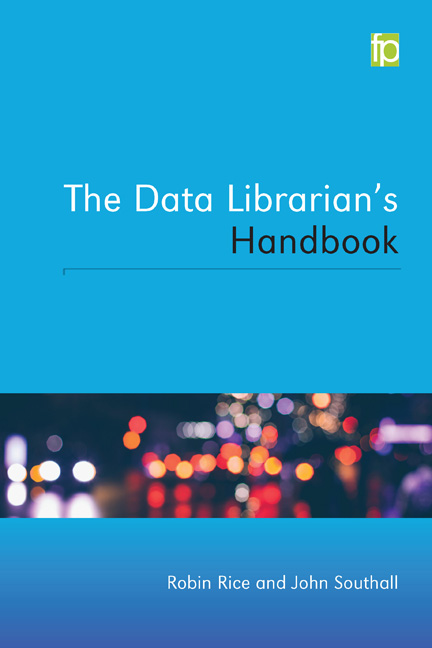Book contents
- Frontmatter
- Contents
- Acknowledgements
- Preface
- 1 Data librarianship: responding to research innovation
- 2 What is different about data?
- 3 Supporting data literacy
- 4 Building a data collection
- 5 Research data management service and policy: working across your institution
- 6 Data management plans as a calling card
- 7 Essentials of data repositories
- 8 Dealing with sensitive data
- 9 Data sharing in the disciplines
- 10 Supporting open scholarship and open science
- References
- Index
1 - Data librarianship: responding to research innovation
Published online by Cambridge University Press: 08 June 2018
- Frontmatter
- Contents
- Acknowledgements
- Preface
- 1 Data librarianship: responding to research innovation
- 2 What is different about data?
- 3 Supporting data literacy
- 4 Building a data collection
- 5 Research data management service and policy: working across your institution
- 6 Data management plans as a calling card
- 7 Essentials of data repositories
- 8 Dealing with sensitive data
- 9 Data sharing in the disciplines
- 10 Supporting open scholarship and open science
- References
- Index
Summary
The rise of data librarians
A university has been defined as ‘just a group of buildings gathered around a library’ (https://en.wikiquote.org/wiki/Shelby_Foote); in any case, the role of the library in academic life is a central one. Those working within libraries make a valuable contribution to supporting research and teaching as well as shaping the character and intellectual life of individual institutions. Whether a university focuses on the humanities, physical sciences, classics or any other number of disciplines, the librarian ultimately works to support learning and the spread of knowledge. This may take many established forms but increasingly there is a need to support new forms of information. Digital data is one particular new form. In the case of data collections and research data creation this has also led to the rise of a new kind of library professional: the data librarian. But to what extent is this in fact a new role and in what ways does it differ from traditional librarianship?
For example, one role of the librarian is to deal with what may be called the lifecycle of information resources. These are the varied tasks to do with evaluation, selection, purchasing and promotion, and preservation of materials within the library. This relies on having a good working knowledge of what readers in a particular area need for their work. It also draws on a familiarity with what is being made available by publishers and other suppliers of information resources. The terms employed to describe a researcher also indicate the orientation or origin of research support services. Some may prefer traditional terms such as patron or – as favoured at the University of Oxford – reader, since this gives continuity to existing provision. The medium or methodologies being applied to the data are unimportant. On the other hand those working on support services created specifically to deal with digital data may feel older terms are inappropriate or anachronistic. Since digital information is often used in conjunction with software it is no longer ‘human-readable’ at all and its value lies in the fact it can be easily supplied to researchers. Their role is to manipulate, interpret, analyse, watch, listen to, or more generally ‘use’ the data. For this reason data centres or repositories often refer to ‘users’ of data.
- Type
- Chapter
- Information
- The Data Librarian's Handbook , pp. 1 - 18Publisher: FacetPrint publication year: 2016



